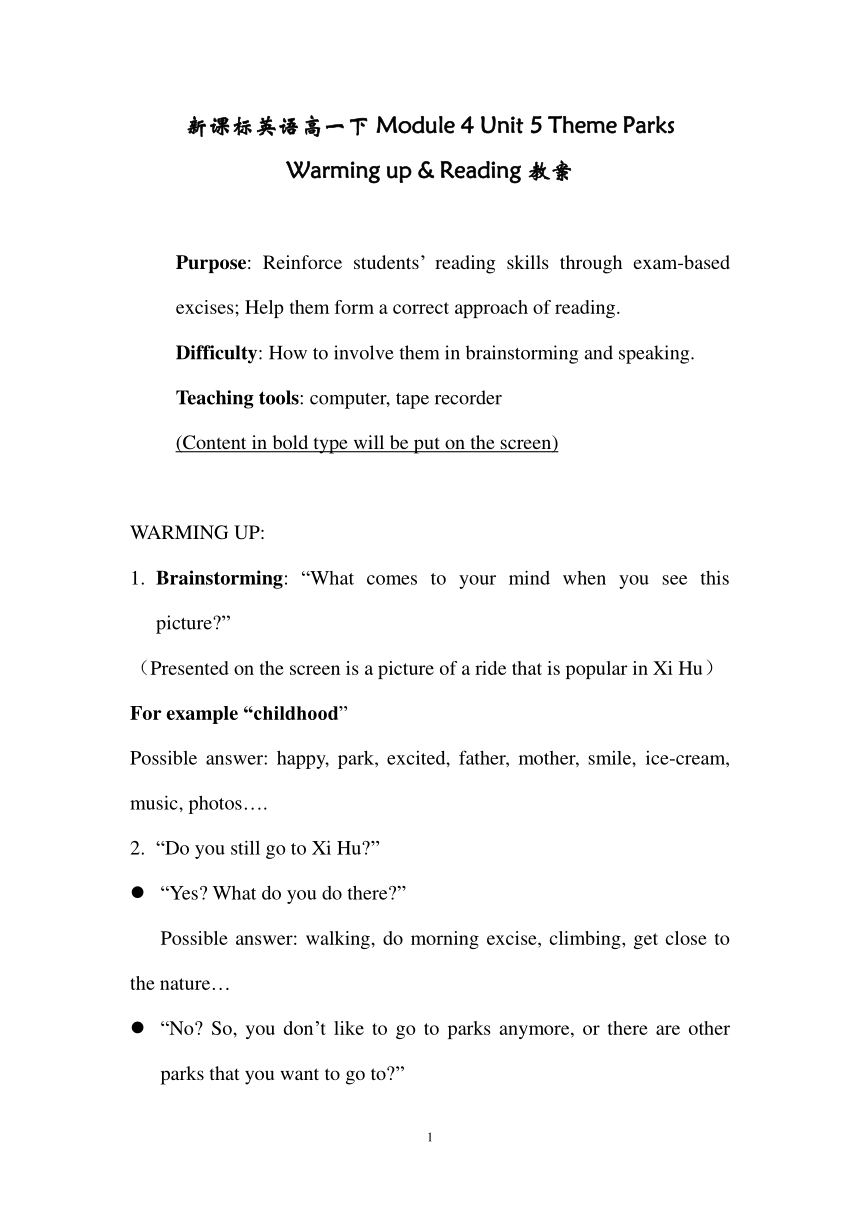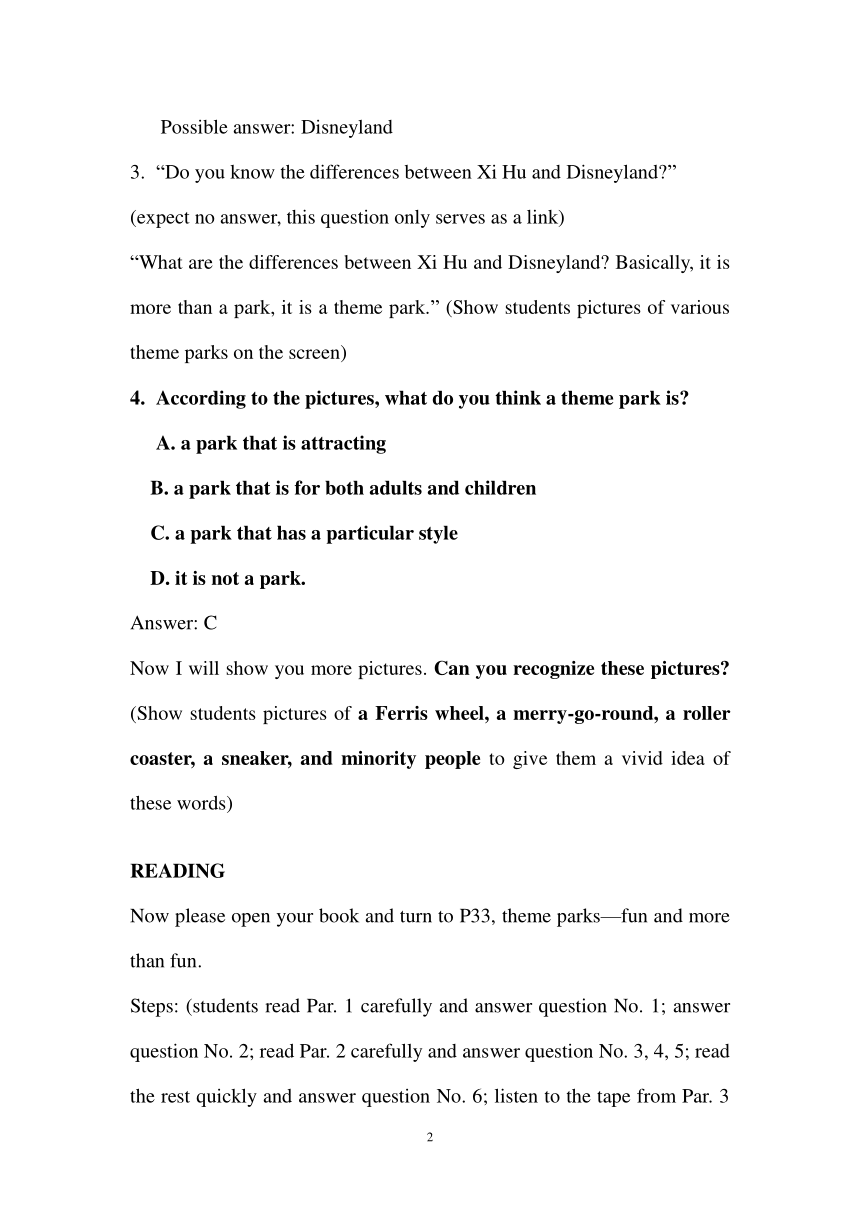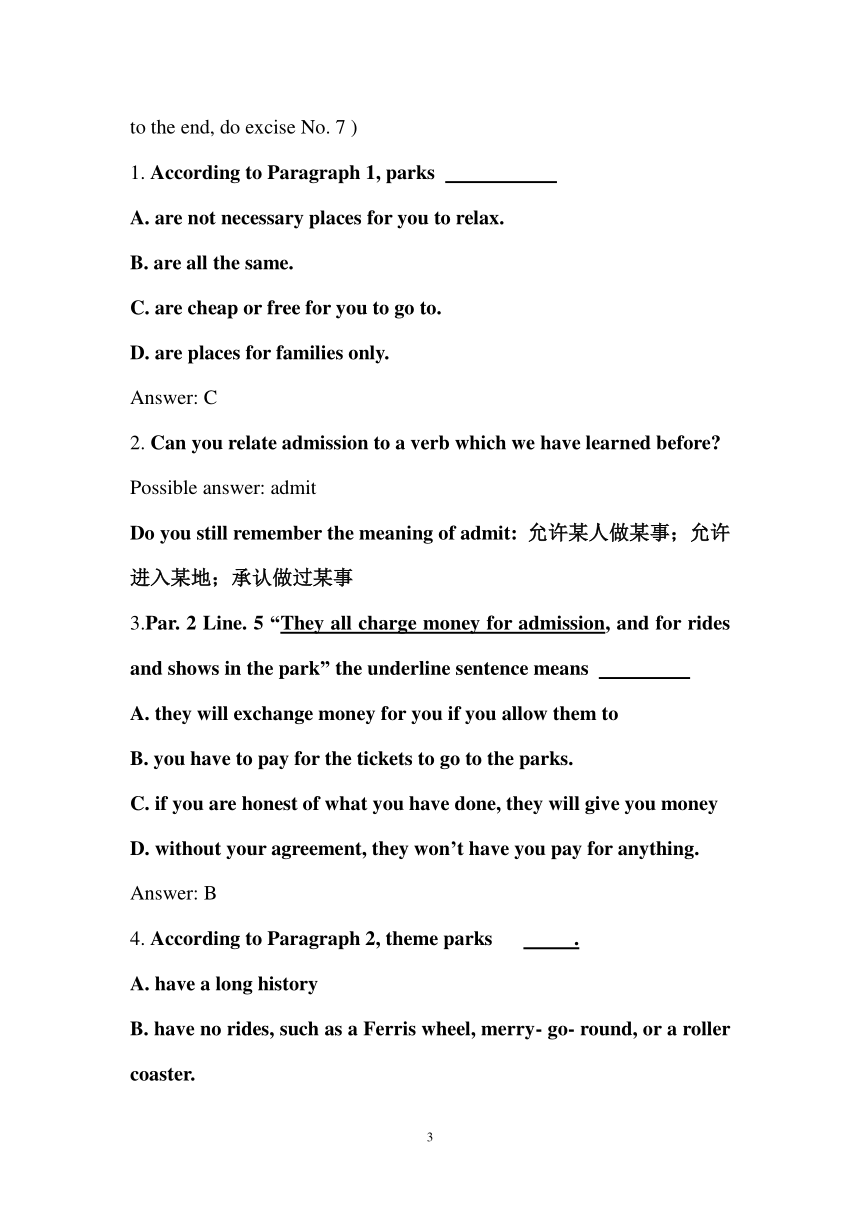Unit 5 Theme Parks Warming up & Reading
文档属性
| 名称 | Unit 5 Theme Parks Warming up & Reading |  | |
| 格式 | rar | ||
| 文件大小 | 13.8KB | ||
| 资源类型 | 教案 | ||
| 版本资源 | 人教版(新课程标准) | ||
| 科目 | 英语 | ||
| 更新时间 | 2008-05-01 10:08:00 | ||
图片预览



文档简介
新课标英语高一下Module 4 Unit 5 Theme Parks
Warming up & Reading教案
Purpose: Reinforce students’ reading skills through exam-based excises; Help them form a correct approach of reading.
Difficulty: How to involve them in brainstorming and speaking.
Teaching tools: computer, tape recorder
(Content in bold type will be put on the screen)
WARMING UP:
1. Brainstorming: “What comes to your mind when you see this picture ”
(Presented on the screen is a picture of a ride that is popular in Xi Hu)
For example “childhood”
Possible answer: happy, park, excited, father, mother, smile, ice-cream, music, photos….
2. “Do you still go to Xi Hu ”
“Yes What do you do there ”
Possible answer: walking, do morning excise, climbing, get close to the nature…
“No So, you don’t like to go to parks anymore, or there are other parks that you want to go to ”
Possible answer: Disneyland
3. “Do you know the differences between Xi Hu and Disneyland ”
(expect no answer, this question only serves as a link)
“What are the differences between Xi Hu and Disneyland Basically, it is more than a park, it is a theme park.” (Show students pictures of various theme parks on the screen)
4. According to the pictures, what do you think a theme park is
A. a park that is attracting
B. a park that is for both adults and children
C. a park that has a particular style
D. it is not a park.
Answer: C
Now I will show you more pictures. Can you recognize these pictures (Show students pictures of a Ferris wheel, a merry-go-round, a roller coaster, a sneaker, and minority people to give them a vivid idea of these words)
READING
Now please open your book and turn to P33, theme parks—fun and more than fun.
Steps: (students read Par. 1 carefully and answer question No. 1; answer question No. 2; read Par. 2 carefully and answer question No. 3, 4, 5; read the rest quickly and answer question No. 6; listen to the tape from Par. 3 to the end, do excise No. 7 )
1. According to Paragraph 1, parks
A. are not necessary places for you to relax.
B. are all the same.
C. are cheap or free for you to go to.
D. are places for families only.
Answer: C
2. Can you relate admission to a verb which we have learned before
Possible answer: admit
Do you still remember the meaning of admit: 允许某人做某事;允许进入某地;承认做过某事
3.Par. 2 Line. 5 “They all charge money for admission, and for rides and shows in the park” the underline sentence means
A. they will exchange money for you if you allow them to
B. you have to pay for the tickets to go to the parks.
C. if you are honest of what you have done, they will give you money
D. without your agreement, they won’t have you pay for anything.
Answer: B
4. According to Paragraph 2, theme parks .
A. have a long history
B. have no rides, such as a Ferris wheel, merry- go- round, or a roller coaster.
C. are big
D. are restaurants where you can see lots of things
Answer: C
5. I told you before that Par. 1 is a general introduction of Parks, what about Par. 2. Who would like to conclude the main idea of Par. 2
Possible answer: a general introduction of theme parks.
6. Now I would like you to read the rest of the text quickly, and find out how many theme parks are referred to in it.
There are theme parks referred to in the text, they are ,
, , , , .
Answers: Sports theme parks, History or culture theme parks, Disneyland, Marine or ocean parks, Science theme parks, Future theme parks.
7. On the screen is a chart about what you can do in those themes parks, some are right, and some are wrong. Please listen to the text carefully and decide which of the following statements are right, which are wrong. Before I play the tape, I would like you to go through the following statements first and Give me your wild guess of the following statements.
Theme parks Activities
Sports theme parks 1. Play or watch sports. ( )2. Ride on animals.( )
History or culture theme parks 3. Take pictures of emperors or minority people.( )4. Know about the life of the early settlers in America.( )
Disneyland 5. See the characters from Disney films.( )6. Swim with dolphins.( )
Marine or ocean parks 7. Help cook see foods.( )
Science theme parks 8. Take an active part in experiments.( )
Future theme parks 9. Go on imaginary trips to space.( )10. Experience life in the past.( )
Answer: 1. T 2. F 3. F 4. F 5. T 6. F 7. F 8. T 9. T 10. F
SPEAKING TASK:
1. “What is your understanding of the title “Theme Parks – Fun and More than Fun”
What is the fun you can have in theme parks, and what do you think is referred to as more than fun You can answer this question by giving examples. Think it over, and then I will ask some students to share their opinions.
You can have great fun in a theme park,
e.g. 1.
2.
……
Not only can you have fun in a them park, but also you can
e.g. 1.
2.
… …
2. Please make up dialogues based on the text about information on theme parks.
e.g. A: a travel agent from a travel agency B: a tourist
(B entered a travel agency and went toward A)
A : Welcome sir/madam, can I help you
B: I want to go to a theme park; can you give me some advice on which one to go
A: Which of the following are you interested in, sports, history and culture, cartoon, nature, or science
B: I prefer sports
A: I think sports theme parks would be the best for you.
B: What fun can I have there
A: Well, you can watch and do some sports, and you can go shopping for sports equipment and closing.
B: Thanks for your information
A: You are welcome.
Activities
Sports … do some physical exercisewatch athletic competitionbuy a particular brand or sports equipment of closing
History or culture theme parks know some facts about our ancestorsride on animalshelp cook cultural foodshave pictures taken in the clothing of emperors or minority people
Disneyland see the characters from Disney filmshave exciting ridesget close to life-size cartoon figuresknow about the life of the early settlers in America
Marine… Swim with dolphins
Science Take an active part in experiments
Future theme parks go on imaginary trips to spaceexperience life in the future by using advanced computer techniques
HOMEWORK:
1. Read the text carefully after class, and underline sentences that you find difficult to understand.
2. Read the text Futuroscope – Excitement and Learning, and write a summary of the text about what you can do in Futuroscope. Next class I will have some students to read their summary.
1
Warming up & Reading教案
Purpose: Reinforce students’ reading skills through exam-based excises; Help them form a correct approach of reading.
Difficulty: How to involve them in brainstorming and speaking.
Teaching tools: computer, tape recorder
(Content in bold type will be put on the screen)
WARMING UP:
1. Brainstorming: “What comes to your mind when you see this picture ”
(Presented on the screen is a picture of a ride that is popular in Xi Hu)
For example “childhood”
Possible answer: happy, park, excited, father, mother, smile, ice-cream, music, photos….
2. “Do you still go to Xi Hu ”
“Yes What do you do there ”
Possible answer: walking, do morning excise, climbing, get close to the nature…
“No So, you don’t like to go to parks anymore, or there are other parks that you want to go to ”
Possible answer: Disneyland
3. “Do you know the differences between Xi Hu and Disneyland ”
(expect no answer, this question only serves as a link)
“What are the differences between Xi Hu and Disneyland Basically, it is more than a park, it is a theme park.” (Show students pictures of various theme parks on the screen)
4. According to the pictures, what do you think a theme park is
A. a park that is attracting
B. a park that is for both adults and children
C. a park that has a particular style
D. it is not a park.
Answer: C
Now I will show you more pictures. Can you recognize these pictures (Show students pictures of a Ferris wheel, a merry-go-round, a roller coaster, a sneaker, and minority people to give them a vivid idea of these words)
READING
Now please open your book and turn to P33, theme parks—fun and more than fun.
Steps: (students read Par. 1 carefully and answer question No. 1; answer question No. 2; read Par. 2 carefully and answer question No. 3, 4, 5; read the rest quickly and answer question No. 6; listen to the tape from Par. 3 to the end, do excise No. 7 )
1. According to Paragraph 1, parks
A. are not necessary places for you to relax.
B. are all the same.
C. are cheap or free for you to go to.
D. are places for families only.
Answer: C
2. Can you relate admission to a verb which we have learned before
Possible answer: admit
Do you still remember the meaning of admit: 允许某人做某事;允许进入某地;承认做过某事
3.Par. 2 Line. 5 “They all charge money for admission, and for rides and shows in the park” the underline sentence means
A. they will exchange money for you if you allow them to
B. you have to pay for the tickets to go to the parks.
C. if you are honest of what you have done, they will give you money
D. without your agreement, they won’t have you pay for anything.
Answer: B
4. According to Paragraph 2, theme parks .
A. have a long history
B. have no rides, such as a Ferris wheel, merry- go- round, or a roller coaster.
C. are big
D. are restaurants where you can see lots of things
Answer: C
5. I told you before that Par. 1 is a general introduction of Parks, what about Par. 2. Who would like to conclude the main idea of Par. 2
Possible answer: a general introduction of theme parks.
6. Now I would like you to read the rest of the text quickly, and find out how many theme parks are referred to in it.
There are theme parks referred to in the text, they are ,
, , , , .
Answers: Sports theme parks, History or culture theme parks, Disneyland, Marine or ocean parks, Science theme parks, Future theme parks.
7. On the screen is a chart about what you can do in those themes parks, some are right, and some are wrong. Please listen to the text carefully and decide which of the following statements are right, which are wrong. Before I play the tape, I would like you to go through the following statements first and Give me your wild guess of the following statements.
Theme parks Activities
Sports theme parks 1. Play or watch sports. ( )2. Ride on animals.( )
History or culture theme parks 3. Take pictures of emperors or minority people.( )4. Know about the life of the early settlers in America.( )
Disneyland 5. See the characters from Disney films.( )6. Swim with dolphins.( )
Marine or ocean parks 7. Help cook see foods.( )
Science theme parks 8. Take an active part in experiments.( )
Future theme parks 9. Go on imaginary trips to space.( )10. Experience life in the past.( )
Answer: 1. T 2. F 3. F 4. F 5. T 6. F 7. F 8. T 9. T 10. F
SPEAKING TASK:
1. “What is your understanding of the title “Theme Parks – Fun and More than Fun”
What is the fun you can have in theme parks, and what do you think is referred to as more than fun You can answer this question by giving examples. Think it over, and then I will ask some students to share their opinions.
You can have great fun in a theme park,
e.g. 1.
2.
……
Not only can you have fun in a them park, but also you can
e.g. 1.
2.
… …
2. Please make up dialogues based on the text about information on theme parks.
e.g. A: a travel agent from a travel agency B: a tourist
(B entered a travel agency and went toward A)
A : Welcome sir/madam, can I help you
B: I want to go to a theme park; can you give me some advice on which one to go
A: Which of the following are you interested in, sports, history and culture, cartoon, nature, or science
B: I prefer sports
A: I think sports theme parks would be the best for you.
B: What fun can I have there
A: Well, you can watch and do some sports, and you can go shopping for sports equipment and closing.
B: Thanks for your information
A: You are welcome.
Activities
Sports … do some physical exercisewatch athletic competitionbuy a particular brand or sports equipment of closing
History or culture theme parks know some facts about our ancestorsride on animalshelp cook cultural foodshave pictures taken in the clothing of emperors or minority people
Disneyland see the characters from Disney filmshave exciting ridesget close to life-size cartoon figuresknow about the life of the early settlers in America
Marine… Swim with dolphins
Science Take an active part in experiments
Future theme parks go on imaginary trips to spaceexperience life in the future by using advanced computer techniques
HOMEWORK:
1. Read the text carefully after class, and underline sentences that you find difficult to understand.
2. Read the text Futuroscope – Excitement and Learning, and write a summary of the text about what you can do in Futuroscope. Next class I will have some students to read their summary.
1
同课章节目录
